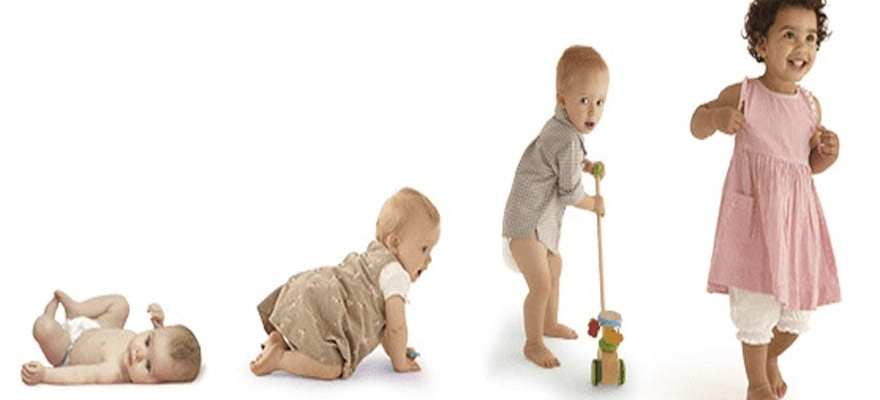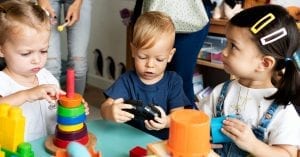
What doctors and child development experts refer to as “developmental milestones” are just specific things that most children can do by a certain age. Children reach milestones in many areas – in how they play, learn, speak, and act. These milestones act as checkpoints in a child’s development and give parents and professionals a general idea of what to expect your child to be able to do at a given age. From the very start, young children are aware of their surroundings and interested in exploring them. Even from early infancy, babies are active learners, gathering and organizing knowledge about their world and learning about themselves.
All children develop at their own pace, so it is impossible to tell exactly when your child will learn a new skill, but developmental milestones will serve as a guide to indicate when particular skills are generally achieved. There is a “range of normal limits” for reaching milestones, and during this timeframe professionals can predict when most children will learn different sets of skills.
Milestones develop in a sequential fashion which means that a child will need to develop some skills before he or she can develop another. For example, children must learn to sit before they can learn to stand. Each milestone that a child acquires builds on the last milestone achieved. Not reaching a milestone at all, or not reaching one within the range of normal limits, can be indicative of a developmental delay in a particular area.
There are different types of developmental milestones – physical (fine and gross motor), cognitive, social/emotional and communication/language skills.
Physical milestones
pertain to the development of both gross (large) and fine motor skills. The large motor skills are usually the first to develop in a young child and are used in sitting, rolling over, crawling, standing and walking. The fine motor skills develop later and require greater precision for tasks such as picking up small objects (like Cheerios), and holding spoons and crayons.
Read Next | 5 Milestones Kids Should Ideally Hit Before Kindergarten
Cognitive milestones
refer to the child’s ability to think, to learn and to solve problems. Very young babies learn by tracking things as they move with their eyes, and by turning towards sounds that they hear. Slightly older babies learn about cause and effect – for example, that pressing a button on a toy makes it light up and make noise. By the time a child is 2 years old, he or she can usually point to pictures in a book and label the picture, while a 4 year-old can be expected to have basic counting skills.
Social and emotional milestones
pertain to a child’s ability to express their own emotions and to respond to the social interactions they have with other people. For example, a 6 month-old child should begin to recognize familiar faces and a 2 year-old should be starting to play with other children.
Read Next | Pick-Your-Own Farms in New Jersey
Communication and language milestones
refer to the child’s verbal and non-verbal communication skills. For example, a 1 year-old may be waving bye-bye while a 5 year-old may be speaking in complex sentences and telling simple stories.
What if my child does not meet a developmental milestone?
Remember that that each child is an individual and may meet developmental milestones a little earlier or later than other children his or her age. It is important for parents to remember that development is a process and NOT a race, and parents do not need to “rush” their child to the next milestone. It is also important for parents to remember that developmental milestones are guidelines and NOT deadlines. However, if you feel that your child has not met one or more milestones within the appropriate range of time, do not hesitate to ask a professional about your concerns. Your child’s doctor, a pediatric nurse, a child psychologist, or behavior specialist are all trained in child development. There are also many other child specialists who are trained in specific areas of development who can be consulted for help about your child’s development. These include speech pathologists, occupational and physical therapists, and audiologists. If you are concerned that your child may not be meeting his or her developmental milestones, you should talk to your pediatrician or call 311 for more information on the Early Intervention Program in NYC, which is available to help children from birth through age 2 who may be experiencing developmental delays.
By Helen E. Murphy, Ph.D., BCBA-D for Thursday’s Child, Inc.

Read Next | Learn about All the Best Pre-school or Daycare Centers on Staten Island

